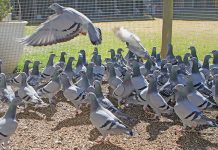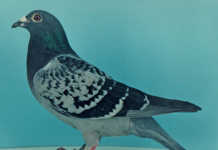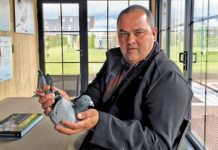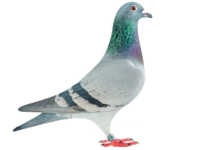World-renowned avian vet Dr Ockert Botha’s recent lectures provided some insight into pigeon diseases, which were covered in the previous two issues. This week will cover crop canker. But first, it must be noted that boosting immunity is vital to keeping disease-causing organisms at bay, especially as they’re becoming more resistant to the standard available treatments, says Ockert.
Medication that was effective in the past, now has little or no effect on certain conditions and treatment, at double the usual prescription dosage or combo-treatment, which usually includes flora builders. Alternating treatment with different products also helps prevent bacteria resistance, he says. Some pigeon illnesses have been found to intermingle with various viral forms and often cause secondary infections, making diagnosis and treatment more difficult.
Boosting immunity
To avoid damaging the bird’s natural intestinal flora, treatment must include pre- and probiotics to boost the immunity system while the pigeon is receiving treatment. Ockert recommends Avio-Entromune, an immune stimulant, intestinal protector and antioxidant. It’s fortified with toxin-binding natural salts that reduce mycotoxin absorption and heavy metal poisoning from some pigeon food and polluted water. “Routine administration of this immune builder is a must during the feeding of healthy babies and during the racing season when pigeons are under stress,” says Ockert.
Crop canker
Trichomoniasis, or crop canker, is one of the main causes of weak performance in a racing team, says Ockert. Besides a drop in performance, symptoms of infection include poor feed intake and the appearance of yellow button-shaped swellings or spots in the mucosa of the throat and on the inside of the beak and the nose lining. A necropsy would also reveal spots on the liver, lungs and other organs.
These deposits are the accumulation of canker pathogens and the swelling will inhibits feed intake and breathing.
The disease is highly contagious and can be transmitted to youngsters in the nests via crop milk fed by the parents. In nestlings, the pathogens reach the umbilical cord via the navel, causing the umbilical form of canker. These factors mean a high mortality rate in young pigeons during an outbreak. The presence of crop canker is best determined by the microscopic examination of mucosa obtained by a crop smear. Routine preventative treatment is a must, as some pigeons are symptomatic carriers of Trichomonas organisms.
The disease is generally treated with metronidazole. Aviomed’s Aviotrich tablets each contain 100mg metronidazole and are coated to prevent vomiting and induce a slow-release action to properly promote absorption. One tablet every eight weeks is effective during preventative disease management, with one tablet for two consecutive days during high incidence. When it comes to more resistant strains, a combination of dimetridazole and ronidazole has reportedly proved effective.
Ultimately though, prevention is always better. Ockert says this can be achieved through maintaining a high immunity with natural products, employing a well-balanced nutritional feeding programme and keeping the loft hygienic.












